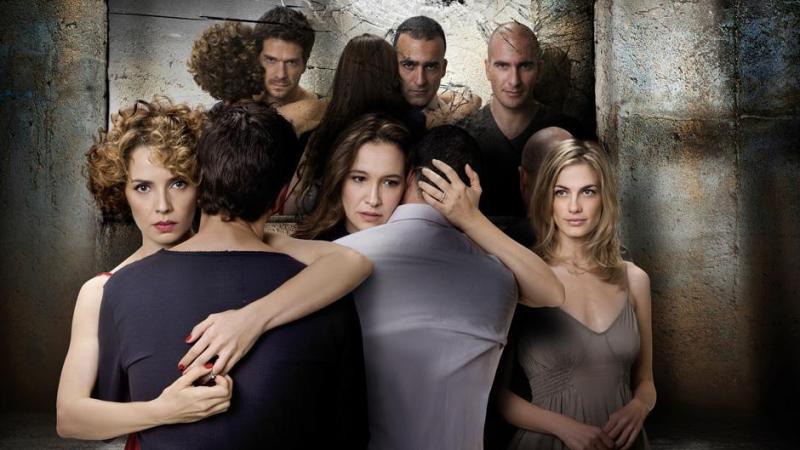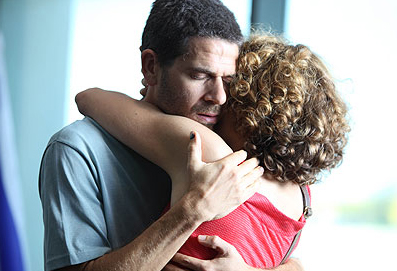Prisoners of War, Sky Arts 1 | reviews, news & interviews
Prisoners of War, Sky Arts 1
Prisoners of War, Sky Arts 1
You've seen Homeland, now here's the Israeli series that spawned it

This is, as you may have heard, the Israeli TV series which provided the inspiration for Homeland, smartly snapped up by Sky Arts to plug the gap left by the latter after last weekend's finale. And guess what - it may be even better than its Hollywood spin-off.
Written and directed with auteur-ish panache by Gideon Raff (who also exec-produced on Homeland), Prisoners of War - or Hatufim in Hebrew - is less the labyrinthine thriller, more a skilful and probing analysis of loss and separation. Where Homeland's central theme was whether or not rescued US Marine Nick Brody had been turned by his Islamist captors and primed to commit terrorist acts back in the USA, Prisoners of War traces the struggle to readjust faced by two Israeli prisoners released 17 years after being captured in Lebanon.
Their families and friends have endured their own kind of purgatory, a form of suspended animation
One of Homeland's less convincing traits has been the way Brody briskly threw off the trauma of his captivity to emerge as focused, disciplined, mentally razor-sharp and capable of Oscar-winning feats of deception. He's more like James Bond than a physically and mentally scarred Marine sergeant. At the opposite, and more plausible, end of the dial are the two protagonists here, Uri Zach (Ishai Golan) and Nimrode Klein (Yoram Toledano).
A pivotal sequence in this opening episode was their arrival on a Red Cross aircraft at Ben Gurion airport, where they were shepherded into a lounge to meet assorted dignitaries and reunite with the families they hadn't seen in almost two decades. Much of the scene's haunting power was delivered by facial expressions and body language. The families stood rooted to the spot, unable to articulate the torrent of mixed emotions. Uri stood like a wounded animal at bay, one eye twitching slightly as he stood in a half-crouch to ward off imagined attackers. Beside him, Nimrode looked aghast and thunderstruck. It needed Uri's elderly, wheelchair-bound father to break the ice by shouting at his son to come and embrace him.
But despite the pitifully broken state of the liberated captives, we begin to learn that "Prisoners of War" doesn't just refer to them. Their families and friends have endured their own kind of purgatory, a form of suspended animation in which attempts to move on with their lives have been undercut by memories of the past and uncertainty about the fate of the prisoners, gone but never quite forgotten. This sense of being trapped in limbo is especially intense for Yael (Adir Ezroni), whose brother Ami was the third Israeli prisoner but died in captivity. She now knows he's dead, but her longing to see him again brings on intense hallucinations in which she can touch him and talk to him.
Everyone pays, one way or another. Nimrode's wife Talya (Yael Abecassis) has become a national heroine for her unflagging campaigning to get the prisoners back, but it seems that her over-developed single-mindedness may now crowd out her disorientated, depleted husband.
Meanwhile, Uri's former sweetheart and bride-to-be, Nurit (Mili Avital), has since married his brother, and she's feeling ripped apart by guilt at Uri's startling return. Her agony is screwed tighter by the insistence of military psychiatrist Haim Cohen (Gal Zaid) that she should act the role of Uri's faithful partner and hide her wedding ring, in an effort to ease his return to his former life. Little does she know that he already knows what happened, thanks to his captors having helpfully left an Israeli newspaper lying around for him to find with its story about how Nurit was "cheating on an entire nation" (Uri and Nurit, pictured below).
 But the sufferings of the prisoners have clearly been in their own unspeakable category, and emerge in brief but horrific flashbacks as the series progresses (I must admit I've cheated and watched all of it). There were glimpses in episode one, where Nimrode's attempts to make love to his wife were shredded by hideous memories of how he was tortured with electric shocks. The setting of the story in Israel, with its existential baggage of conflict and controversy, lends the issues and emotions painful urgency. You really should watch this, if you aren't already.
But the sufferings of the prisoners have clearly been in their own unspeakable category, and emerge in brief but horrific flashbacks as the series progresses (I must admit I've cheated and watched all of it). There were glimpses in episode one, where Nimrode's attempts to make love to his wife were shredded by hideous memories of how he was tortured with electric shocks. The setting of the story in Israel, with its existential baggage of conflict and controversy, lends the issues and emotions painful urgency. You really should watch this, if you aren't already.
The future of Arts Journalism
You can stop theartsdesk.com closing!
We urgently need financing to survive. Our fundraising drive has thus far raised £49,000 but we need to reach £100,000 or we will be forced to close. Please contribute here: https://gofund.me/c3f6033d
And if you can forward this information to anyone who might assist, we’d be grateful.

Subscribe to theartsdesk.com
Thank you for continuing to read our work on theartsdesk.com. For unlimited access to every article in its entirety, including our archive of more than 15,000 pieces, we're asking for £5 per month or £40 per year. We feel it's a very good deal, and hope you do too.
To take a subscription now simply click here.
And if you're looking for that extra gift for a friend or family member, why not treat them to a theartsdesk.com gift subscription?
more TV
 Coldwater, ITV1 review - horror and black comedy in the Highlands
Superb cast lights up David Ireland's cunning thriller
Coldwater, ITV1 review - horror and black comedy in the Highlands
Superb cast lights up David Ireland's cunning thriller
 Blu-ray: The Sweeney - Series One
Influential and entertaining 1970s police drama, handsomely restored
Blu-ray: The Sweeney - Series One
Influential and entertaining 1970s police drama, handsomely restored
 I Fought the Law, ITVX review - how an 800-year-old law was challenged and changed
Sheridan Smith's raw performance dominates ITV's new docudrama about injustice
I Fought the Law, ITVX review - how an 800-year-old law was challenged and changed
Sheridan Smith's raw performance dominates ITV's new docudrama about injustice
 The Paper, Sky Max review - a spinoff of the US Office worth waiting 20 years for
Perfectly judged recycling of the original's key elements, with a star turn at its heart
The Paper, Sky Max review - a spinoff of the US Office worth waiting 20 years for
Perfectly judged recycling of the original's key elements, with a star turn at its heart
 The Guest, BBC One review - be careful what you wish for
A terrific Eve Myles stars in addictive Welsh mystery
The Guest, BBC One review - be careful what you wish for
A terrific Eve Myles stars in addictive Welsh mystery
 theartsdesk Q&A: Suranne Jones on 'Hostage', power pants and politics
The star and producer talks about taking on the role of Prime Minister, wearing high heels and living in the public eye
theartsdesk Q&A: Suranne Jones on 'Hostage', power pants and politics
The star and producer talks about taking on the role of Prime Minister, wearing high heels and living in the public eye
 King & Conqueror, BBC One review - not many kicks in 1066
Turgid medieval drama leaves viewers in the dark
King & Conqueror, BBC One review - not many kicks in 1066
Turgid medieval drama leaves viewers in the dark
 Hostage, Netflix review - entente not-too-cordiale
Suranne Jones and Julie Delpy cross swords in confused political drama
Hostage, Netflix review - entente not-too-cordiale
Suranne Jones and Julie Delpy cross swords in confused political drama
 In Flight, Channel 4 review - drugs, thugs and Bulgarian gangsters
Katherine Kelly's flight attendant is battling a sea of troubles
In Flight, Channel 4 review - drugs, thugs and Bulgarian gangsters
Katherine Kelly's flight attendant is battling a sea of troubles
 Alien: Earth, Disney+ review - was this interstellar journey really necessary?
Noah Hawley's lavish sci-fi series brings Ridley Scott's monster back home
Alien: Earth, Disney+ review - was this interstellar journey really necessary?
Noah Hawley's lavish sci-fi series brings Ridley Scott's monster back home
 The Count of Monte Cristo, U&Drama review - silly telly for the silly season
Umpteenth incarnation of the Alexandre Dumas novel is no better than it should be
The Count of Monte Cristo, U&Drama review - silly telly for the silly season
Umpteenth incarnation of the Alexandre Dumas novel is no better than it should be
 The Narrow Road to the Deep North, BBC One review - love, death and hell on the Burma railway
Richard Flanagan's prize-winning novel becomes a gruelling TV series
The Narrow Road to the Deep North, BBC One review - love, death and hell on the Burma railway
Richard Flanagan's prize-winning novel becomes a gruelling TV series

Add comment